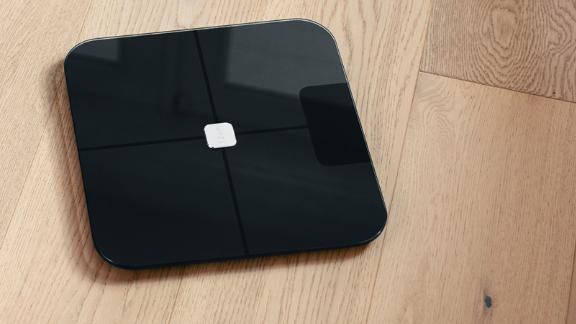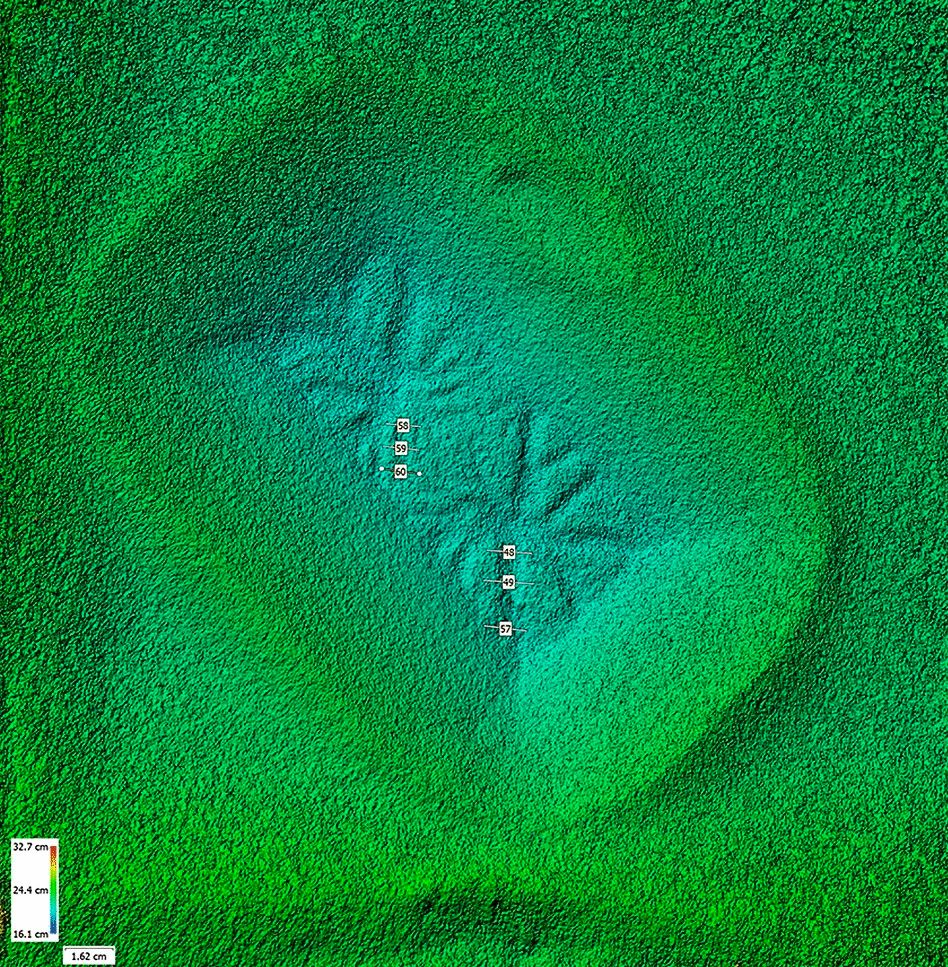(CNN) –
The term self-care is often intertwined and represents everything from meditation to working on your fitness. This vein is equipped with an intelligent scale that promises to help you track not only your weight, but also your BMI, bone mass and more. While tracking BMI and other biometric data is debatable (you can read more about it below), one thing is undeniable: A smart scale connected to the app is one of the easiest ways to track your weight, so you can easily track your fitness goals over time.
For a month, we tested eight top-of-the-line intelligent scales, paying particular attention to compatibility, weight accuracy, appearance and overall performance. We downloaded apps, synced Bluetooth and Wi-Fi with varying degrees of success, talked to a sports doctor and weighed ourselves several times. In the end, one of them placed himself above all others:

When we unpacked this slim and elegant glass scale, we were immediately impressed by its simple and aesthetic appearance. The design of this scale is similar to several others we tested that were much more expensive. It’s thin and light and fits into places where most people like to hide a scale, like under a bed, a dresser, or a very narrow bathroom cabinet.
Most scales are similar, but the Wyze scale was lighter than most and was easier to move around when we were done with the installation process, which was extremely simple. If you already have Wyze cameras at home, use the same application, otherwise just download the application and pair it with the scale. After entering basic data such as date of birth and height, step on the scale for your first measurement and set your desired target weight. They are displayed at the top of the application, with a small graph (and a flag on the lens) to track your progress.
The device must be near the scale to be paired, but once paired, we had no problem with the device staying paired and recording all the information. You can also pair it with Apple Health, Google Fit, Fitbit and others if you prefer to track your weight.
We liked the way the numbers were displayed on the Wyze: easy to read white numbers that lit up brightly. Even in a wet bathroom and on a dark January morning, we didn’t have to squint to read it. This is the easiest to read scale we tested, as the other scales had lower values or lower values.
Of course, if those bright white numbers are wrong, the rest is irrelevant. Still, the Wyze scale turned out to be one of the most accurate scales we tested for weight. Compared to analog scales, Wyze never exceeds 0.2 pounds. By comparison, some of the other weights, like the Fitbit Aria Air, could add up to a pound. When we stepped on the scale and set a weight of 10 pounds, the measurement jumped by exactly 10 pounds.
Since weight can fluctuate depending on the time of day, we made sure to weigh ourselves at the same time during testing – morning and afternoon – to ensure accuracy and to avoid significant weight spikes or drops in readings. With the Wyze scale, we didn’t have daily fluctuations that indicated we had gained or lost a few pounds in 24 hours. Most other scales achieved the same result, although some, like the cardio scale, fluctuated by about half a pound on most days.
And these numbers are easily combined with the app, so it was easy to track our weight over time. We have found that connected devices need to be about a meter away from the scale to record the information in the application, so don’t leave them on the dresser while you are weighing in the basement. It won’t work.

The application itself was very easy to use and read. Captures weight, fat, muscle mass, body water, lean body mass, bone mass, protein, visceral fat, basal metabolic rate (BMR) and metabolic age. (Note: All scales perform their additional detection by the electrical current flowing through your body. If you have a pacemaker or other electrical implant, consult your physician before using one of these scales). When you open the application, your weight is displayed, along with a summary of what you’ve lost or gained and other measurements. You can set your weight control by week, month or year and watch the graph go down (or up) as you reach your goals.
If you’re already using another fitness application, Wyze Ladder can feed your data into various applications such as Apple Health, Google Fit, and Fitbit (the company promises to work with Samsung soon). The deal is simple: Just go to the Wyze application, click on the device logo and go to Permission for third party application. From there, after you’ve weighed yourself, you can, for example. For example, click on Apple Health and review your data under Body Measures.
The Wyze scale can pair up to eight devices, and we had no problems connecting iPhones, iPads, and Android phones during our test. Up to eight users can also be recognized, allowing multiple family members to keep track of their health and fitness data. Note that, as with some other scales, authorized users you add may also switch to viewing your information in the application.
Another clue: In 2019, Wyze was hit with a data breach that allowed hackers to access user data, but not passwords. This vulnerability is common among smart camera manufacturers and was the target of this hack. However, a spokesperson for the company assured us that Wise is working to fix the situation: Internally, we have implemented a whole list of security improvements and enhancements, such as auditing and enforcing internal policies and security settings for each server. We have also improved our internal integration processes with single sign-on, mandatory multi-factor authentication for internal tools and security training at Wyze.
Externally, we have introduced security features for our users, including multi-factor authentication in the Wyze and Wyze web application, the ability to change an email account, and an anomaly detection mechanism that sends alerts to the user when our system detects abnormal behavior at login, the spokesperson said.
Wyze’s accurate scale, easy-to-read display, and simple but useful application – not to mention its sleek design – make it the best option if you’re looking for a smart scale, especially considering its relatively affordable price of $19.54.
Smart scales promise to give you a clear picture of your health and fitness without requiring a lot of work. But are their measurements of things like Body Mass Index (BMI), body fat, etc. accurate? Not quite, says Stella L. Volpe, PhD, RDN, ACSM-CEP, FACSM, director of Virginia Tech’s Department of Human Nutrition, Diet and Exercise. The technology of these scales has certainly improved, but the bioelectrical impedance analysis (BIA) may still not be completely reliable, Volpe says.
My concern is that they’re generally not as accurate as the obvious high-end devices, and that can make people think they’re really fragile or that they’re really out of whack, which can’t be true in either case. They may be somewhere in the middle, Volpe says. I think by using scales we are trying to go beyond what we know and measure that better. Note that these measurements on either side of the standard deviation may not be accurate. This may not be quite right.
The process of testing the smart scales was thorough and took almost a month. This involved downloading different applications, familiarizing himself with different measurements, and discussing with Dr. Volpe how the measurements worked – and if they worked. Finally, we weighed up the pros and cons. Over and over again.
Here’s the breakdown of our tests:
Power
- Readability: Literally: Can you easily read numbers and information while on the scale? We discovered this by standing on each scale and looking at the numbers.
- Accuracy: We place these smart scales on the simplest scales made specifically for weighing, and compare their measurement to both our body weight and our body weight plus 10 pounds of arm weight.
- Consistency: We checked the daily statements for many variations – including some fluctuations during the holidays – to ensure that the balances were not only correct, but consistently accurate.
- Technology: We determined how easy it is to link scales to applications and how close devices – phones, tablets – need to be to the scale to record measurements in applications.
- Easy installation: For this test, we started from scratch for each scale, turned them on, connected them to an application, connected them to external applications and checked that the Bluetooth and/or Wi-Fi connection was working.
Compatibility
- How many different devices can it connect to? We have verified that you can use your scale with your phone, tablet, laptop and others.
- Usability Application Is the scale application easy to use, how does it present information and what does it track?
- Application Compatibility : Do you need to use the official scale app, or can you just pair it and sync with Apple Health, MyFitnessPal, Google Health, Fitbit, etc.?
- How many users it can track: Can you add your whole family so everyone can keep score? And above all: Is this personal information?
Construction
- Total area : Does the scale take up a lot of space, is it easy to store, is it big or heavy?
- The design: While we know that what’s aesthetic can be subjective, we always give our unsourced opinion on the most attractive range and colours.
X-Factors
- Warranty: We looked at whether the product had that capability and, if so, how long it would take.
- Privacy: We have reviewed each privacy policy to see how much of your information, if any, is shared and with whom.
Using the procedures described above, we gave each intelligent scale a score in each subcategory, combined these numbers to obtain the maximum score in each category, and then added these numbers to obtain the final total score. We have broken down the result as follows:
- Performance can be evaluated with a maximum of 45 points: Readability (10 points), accuracy (10 points), consistency (10 points), technique (10 points), and ease of adaptation (5 points).
- There were up to 35 points for compatibility: how many devices were paired (10 points), ease of use of the application (10 points), compatibility of the application (10 points), and how many users had been detected (5 points).
- The building scored a maximum of 10 points: Total area (5 points) and design (5 points).
- X-factors had a maximum of 10 points : Security (5 points) and confidentiality (5 points).
- Other factors : In addition to the item section, we considered other factors such as the price of the scale and its features compared to other models.
Eufy Smart Scale P1 ($44.99; amazon.com)

Intelligent P1 Eufy scale
PHOTO:
Amazon
This smart ladder, one of two we tested with Yufi, was another strong competitor. The configuration can be done easily by downloading the application from the Apple App Store (it is also available for Android). It’s a nice scale, and the app was easy to use (you can also connect to Apple Health, Google Health, and Fitbit). The Eufy P1 was extremely stable and accurate even with multiple daily weighings, with and without the 10-pound arm weight we used for the test. We really liked the rounded edges of this ladder; if you have small children running around, you don’t have to worry about them (or yourself) scratching it. The only downside to Eufy P1 is that you can have 16 individual users, but everyone can see each other’s information. (It’s up to you whether you want to share your weight and progress with 15 family members!) A one-on-one with the Wyze scale, even though it’s twice as expensive. We think you’d better go for the Wyze scale.
Withings Body Plus ($79, originally $99.95; amazon.com)

Withings Body Plus
PHOTO:
Amazon
The Withings Body Plus, one of three scales we tested from Withings, which also makes sleep and fitness watches, is another scale we really liked. It was our favourite product in the Withings range. Installation was easy, with simple instructions and a quick connection. If you can install a Bluetooth speakerphone, you can set up this Smart Scale. The app that the balance works with is called Health Mate, and you can add individual accounts for your family members so that nosy relatives or roommates can’t see your medical records. Plus, the scale works with Wi-Fi, so if you’re connected, you don’t need to open the application or have your phone nearby to save a reading. The weighing results were consistent across different tests. The only criticism of this scale is that it is extremely difficult to read the numbers while standing on them, as most of the screen is taken up by a graph that can be both motivating and depressing, depending on which direction it appears. An interesting option on this and other Withings scales is the Pregnancy Mode, which gives the user a weekly overview of the current stage of pregnancy and cumulative weight gain, and how it corresponds to the customised recommendations.
But the ability to create different accounts for different users and the pregnancy mode don’t justify the $79 price in our opinion, especially given the difficulty of reading the screen.
Fitbit Aria 2 (amazon.com)

Fitbit Aria 2
PHOTO:
Amazon
The Fitbit Aria 2 recently went off sale, but if you can find it, you’ll get a big boost if you’re already integrated into the Fitbit universe. Another black scale, made of glass and lightweight, that slides under the vanity and has an easy-to-read display. He’s using the Fitbit app. If you already track your workouts, weight, BMI, lean mass and diet in the program, Aria makes it easy and fits right into your program. You can add eight users to the scale, and if you sync with your friends on Fitbit, you can share your progress. If you just run a normal, unsynchronized weighing, it takes about 10 seconds for the numbers to appear on the scale, which some critics have not appreciated. It’s an excellent balance that came close to Wyze’s in terms of total points. It’s a good choice if you like Fitbit products and its application, but if you find the application a bit cumbersome, it might not be for you.
Qardio Base 2 ($134.10, originally $149; amazon.com)

Cardio Basic 2
PHOTO:
Amazon
This scale was easy to set up, but difficult to store due to its weight and unique shape. Cardio weighs a few pounds more than the rest of the scale, and we think it has its place in Drake. It’s very smooth and stiff, but you can’t see the numbers clearly when you stand on them. We found the application a bit clunky on the iPhone as the information display became overwhelming. We also discovered that he was tracking our information as a guest, even when we were logged in and our phone was next to the open app.
Fitbit Aria Air ($39.95, originally $49.95; amazon.com)

Fitbit Aria Air
PHOTO:
Amazon
The cheaper Fitbit Aria Air was a bit difficult to install. First we had to download the firmware patch for the Air, then the Fitbit application. Once the patch was downloaded, it was easy, but we weren’t fans of the extra step. We also had to restart the phones almost every time we wanted to sync, which also caused problems for users. While just as elegant as the Aria 2, it wasn’t as imposing and our scales weren’t uniform – for example, we weighed two pounds more with this scale in the kitchen than in the bathroom.
Withings Body ($49.95, originally $59.95; withings.com)

Pigs Pig carcasses
PHOTO:
Withings
This scale is essentially identical to the Withings Body Plus scale but it only tracks weight and BMI. She was accurate and consistent and we had no problem with her. The design is almost identical to that of the Hull Plus. It offers the same pregnancy control option and has kept its promise. But compared to the other scales we tested, it doesn’t offer much for the price, and indeed shares the problem of small metrics.
Withings Body Cardio ($119.96, originally $149.99; withings.com)

Withings’ body cardio
PHOTO:
Withings
The most expensive Withings scale we have ever tested. This option was also easy to install, consistent and accurate on tiles, parquet and carpets. It promises to track weight, body weight, BMI, and heart rate while you stand (though, again, our experts doubt these numbers are accurate beyond weight and BMI). This scale is also connected to Alexa, and you can ask her your weight and other measurements if you find it amusing. But we don’t think those bells and whistles justify the high price of this scale.
Eufy Smart Scale C1 ($29.99, originally $32.99; amazon.com)

C1 Eufy Smart Scale
PHOTO:
Amazon
This is the cheapest model from Eufy, and the price difference was really demonstrated in the test. Installation was easy and the design was similar, but we had incredible difficulty reading more than weight and BMI. We also noted that Amazon reviewers pointed out that it is difficult to connect to the electrical points on the ladder that produce these other measurements. It was suggested that a towel be used to wet the contact points. It seems like a good way to get a shock (or worse!), so we didn’t try it. The weight measurements were accurate, but the lack of access to other information (the application was not always synchronized) caused this scale to lose a lot of points.
Wi-Fi Smart Body Composition Scale products ($49.95; amazon.com)

Great products Wi-Fi Smart Scales
PHOTO:
Amazon
Of all the smart scales we tested, Greater Goods’ was the most interesting, even though we never got it to work. This scale works over Wi-Fi, not Bluetooth. So the configuration should be as simple as the connection, but it’s not. After several attempts, we contacted Greater Goods customer service, with whom we got along very well. They asked us about our error message (we didn’t understand – the app worked, the scale worked, but they wouldn’t connect) and sent us a picture of the router we were using. There are several options, such as. B. restart the Wi-Fi and phone. Unfortunately, according to Greater Goods, their scale doesn’t work well with our internet router. They said: We are having problems connecting our scales to our Xfinity routers. This means we can send you either a travel router (which essentially acts as a bridge to connect your network to the scale) or a Bluetooth scale. As we have not had the opportunity to fully test this scale, we cannot recommend it.
Related Tags:
best smart scales 2020, eufy smart scale, withings body+, best bathroom scale consumer reports, wyze scale, withings scale, best smart scale reddit, best smart scales australia




